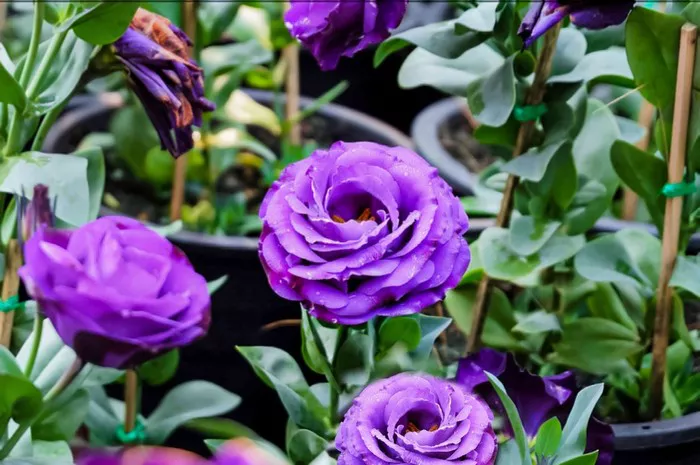Lisianthus flowers, with their delicate petals and graceful appearance, have long captivated both florists and flower enthusiasts alike. Beyond their aesthetic appeal, these blossoms carry deep symbolism and meaning across various cultures and contexts. From love and gratitude to appreciation and admiration, the lisianthus flower’s significance transcends mere beauty, making it a popular choice for a myriad of occasions. In this comprehensive exploration, we delve into the rich symbolism of the lisianthus flower, uncovering its nuanced meanings and cultural significance.
Origins and Botanical Background
Before delving into its symbolism, understanding the origins and botanical characteristics of the lisianthus flower provides valuable context. Native to warm regions of the southern United States, Mexico, the Caribbean, and northern South America, lisianthus, scientifically known as Eustoma grandiflorum, belongs to the Gentianaceae family. Its name is derived from the Greek words “lysis,” meaning dissolution or loosening, and “anthos,” meaning flower, reflecting the flower’s delicate appearance.
Lisianthus flowers typically bloom in a variety of colors, including white, pink, lavender, purple, and blue. Their petals have a satin-like texture and a trumpet-shaped form, lending them an elegant and sophisticated allure. Despite their delicate appearance, lisianthus flowers are remarkably resilient and long-lasting, making them a popular choice for floral arrangements and bouquets.
Love and Romance
One of the most prevalent interpretations of the lisianthus flower is its association with love and romance. Much like other blossoms such as roses and tulips, lisianthus flowers convey sentiments of affection, passion, and devotion. Their exquisite beauty and graceful appearance make them an ideal choice for expressing romantic intentions and gestures.
In the language of flowers, the lisianthus flower symbolizes deep and sincere love. When given as a gift to a romantic partner, these blooms convey a heartfelt message of adoration and commitment. Whether presented as a single stem or incorporated into a lavish bouquet, lisianthus flowers have the power to evoke feelings of romance and enchantment.
Appreciation and Gratitude
Beyond matters of the heart, lisianthus flowers also carry symbolism related to appreciation and gratitude. Their elegant blooms and understated charm make them a fitting choice for expressing thanks and recognition to loved ones, friends, or colleagues. Whether celebrating a special occasion or simply expressing appreciation for someone’s support and kindness, lisianthus flowers convey sentiments of gratitude with grace and sincerity.
Presenting a bouquet of lisianthus flowers is a thoughtful way to express appreciation for acts of kindness, gestures of friendship, or moments of support. Their delicate petals and gentle hues serve as a visual reminder of the value and significance of the bond shared between individuals. Whether given in a professional or personal context, lisianthus flowers communicate gratitude in a meaningful and heartfelt manner.
Elegance and Sophistication
In addition to their symbolic associations with love and gratitude, lisianthus flowers are often admired for their inherent elegance and sophistication. Their refined appearance and graceful demeanor make them a symbol of beauty, poise, and refinement. Whether showcased in a bridal bouquet, a centerpiece arrangement, or a decorative display, lisianthus flowers add a touch of timeless elegance to any setting.
The understated beauty of lisianthus flowers is often likened to that of roses and orchids, renowned for their classic appeal and enduring charm. Their versatility and aesthetic appeal make them a popular choice for various occasions, from weddings and formal events to everyday floral arrangements. Whether used as a focal point or as part of a larger ensemble, lisianthus flowers exude an air of sophistication and grace that transcends trends and fads.
Resilience and Strength
Despite their delicate appearance, lisianthus flowers possess a surprising resilience and strength, symbolizing perseverance and endurance in the face of adversity. Their ability to thrive in diverse climates and conditions serves as a metaphor for resilience and tenacity in life’s journey. In times of challenge or hardship, lisianthus flowers serve as a reminder of the importance of resilience and inner strength.
Presenting lisianthus flowers to someone facing difficulties or obstacles can serve as a source of encouragement and support. Their elegant blooms symbolize the belief in overcoming challenges and emerging stronger on the other side. Whether as a gesture of solidarity or a token of support, lisianthus flowers convey a message of resilience and fortitude in the face of adversity.
Cultural Significance
The symbolism of lisianthus flowers varies across different cultures and traditions, reflecting the diverse interpretations and meanings attributed to these blossoms. In Japanese culture, lisianthus flowers are associated with grace, elegance, and refinement, making them a popular choice for floral arrangements in formal settings such as weddings and tea ceremonies.
In Victorian England, lisianthus flowers were often exchanged as tokens of appreciation and admiration, symbolizing the sender’s sentiments of love and admiration for the recipient. Similarly, in Western culture, lisianthus flowers are frequently used in romantic gestures and expressions of affection, symbolizing deep and sincere love.
Conclusion
In conclusion, lisianthus flowers embody a wealth of symbolism and meaning that transcends their delicate appearance. From love and romance to appreciation and gratitude, these blossoms convey a range of emotions and sentiments with grace and elegance. Whether used to celebrate special occasions or to express heartfelt sentiments, lisianthus flowers serve as timeless symbols of beauty, resilience, and enduring love. Their delicate petals and gentle hues continue to captivate hearts and minds, making them a cherished choice for floral arrangements and bouquets across the globe.


